人教版(2019)必修第三册Unit3 Diverse Cultures单词及重点句式课件(57张ppt)
文档属性
| 名称 | 人教版(2019)必修第三册Unit3 Diverse Cultures单词及重点句式课件(57张ppt) | 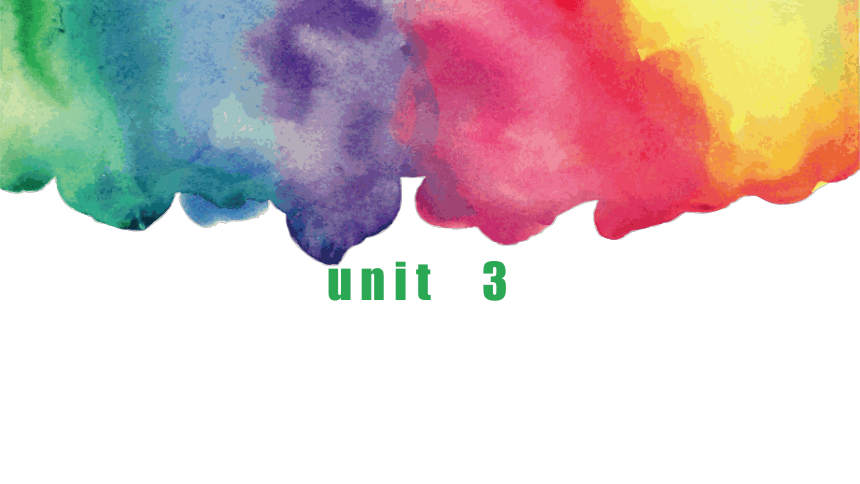 | |
| 格式 | zip | ||
| 文件大小 | 7.6MB | ||
| 资源类型 | 教案 | ||
| 版本资源 | 人教版(2019) | ||
| 科目 | 英语 | ||
| 更新时间 | 2022-05-23 19:01:18 | ||
图片预览


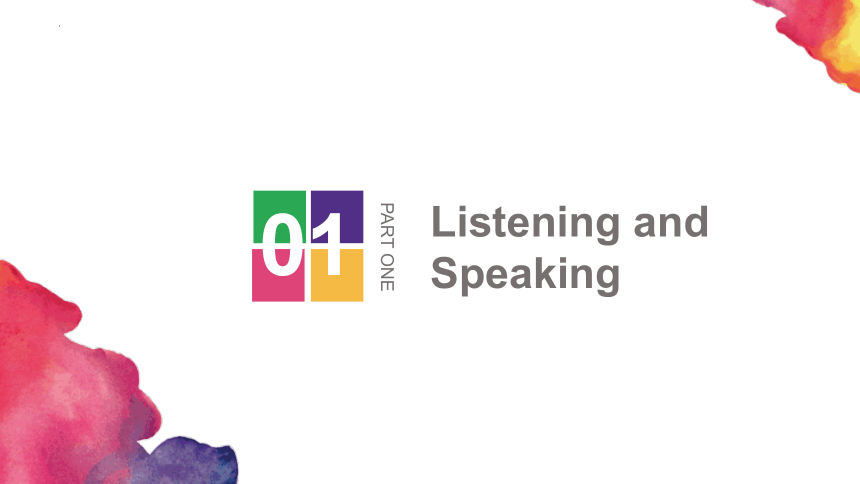
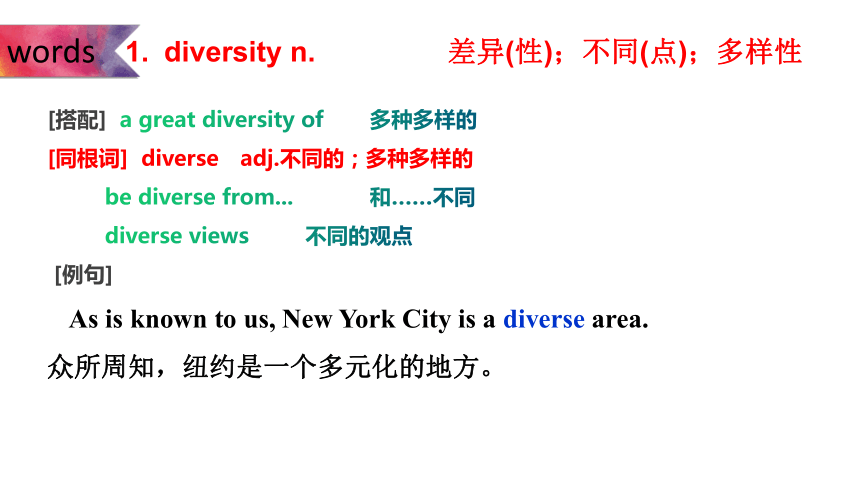
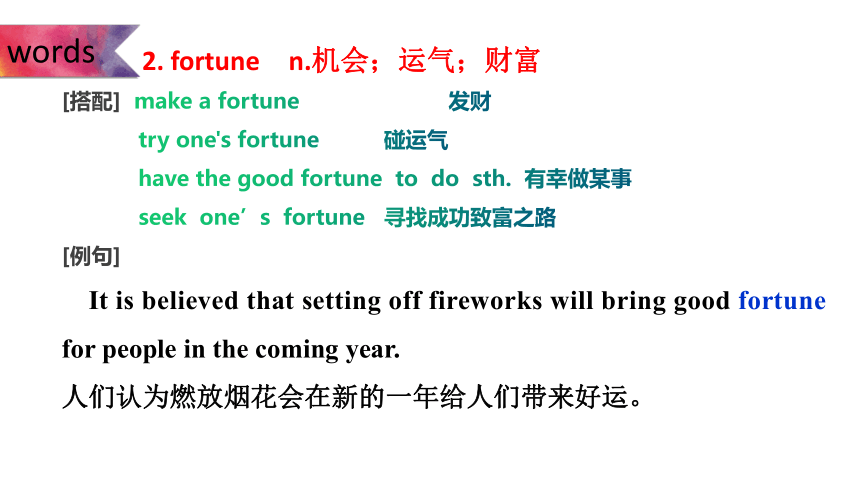
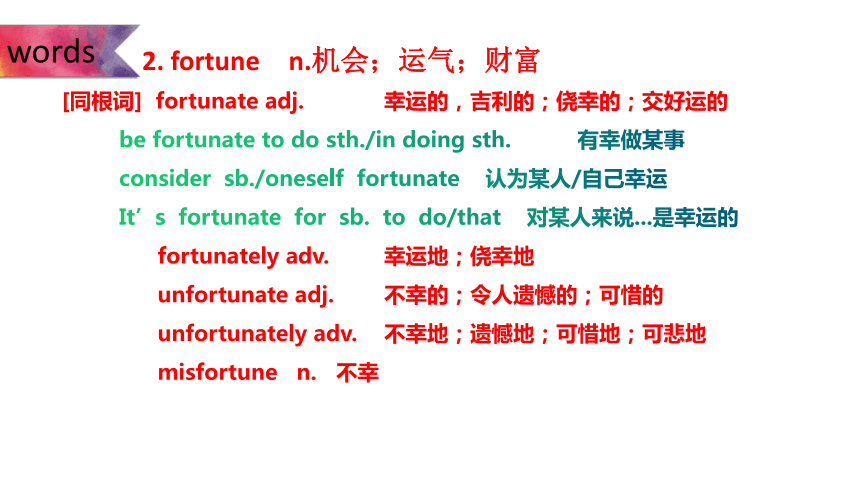
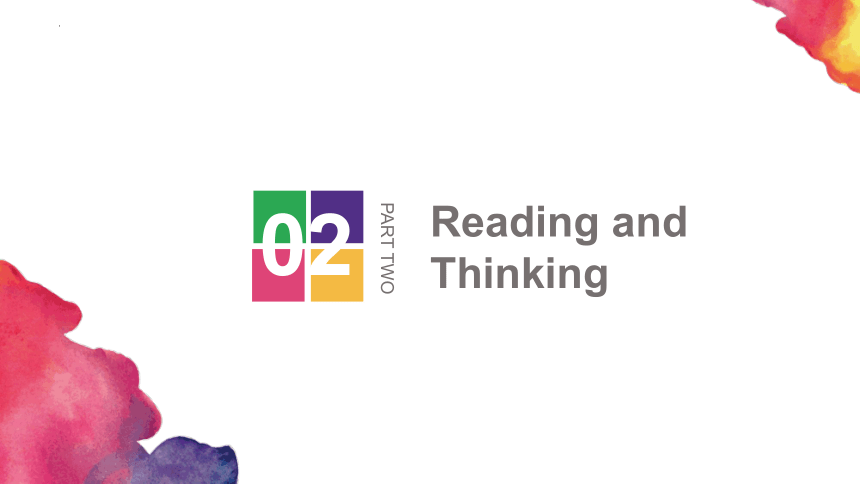
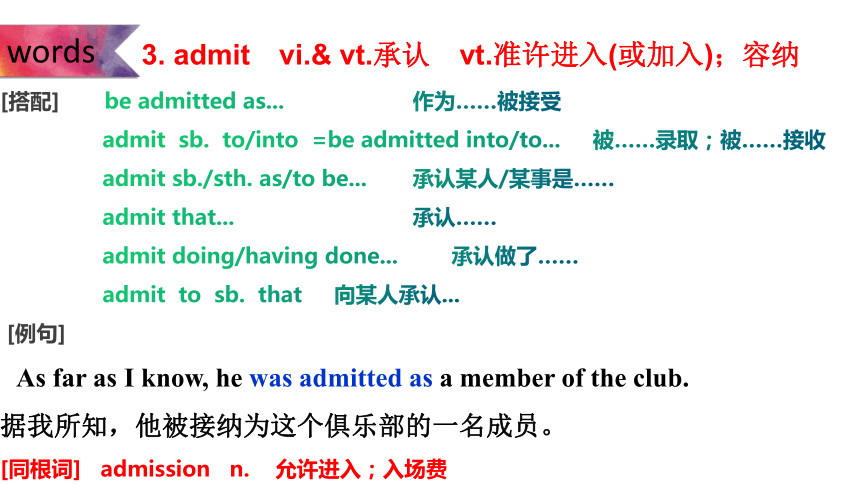
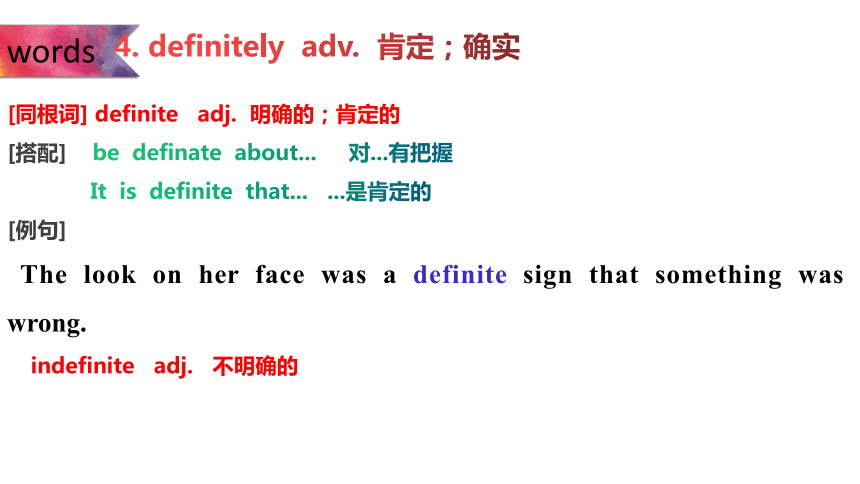

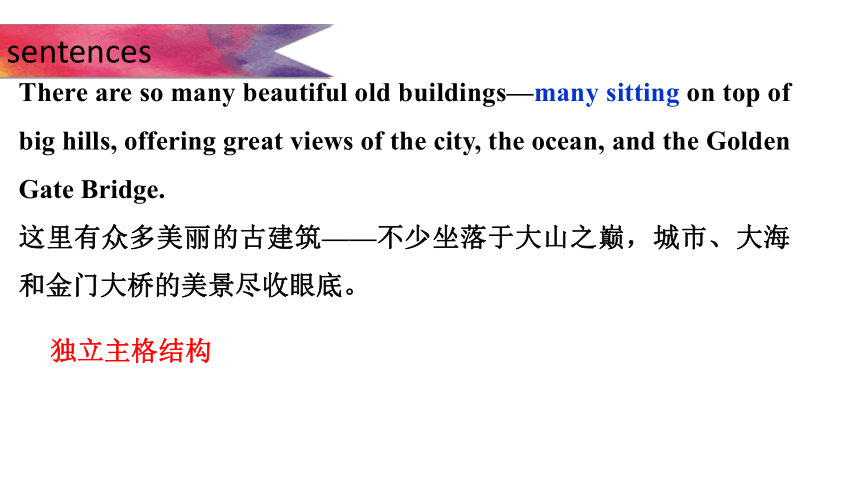
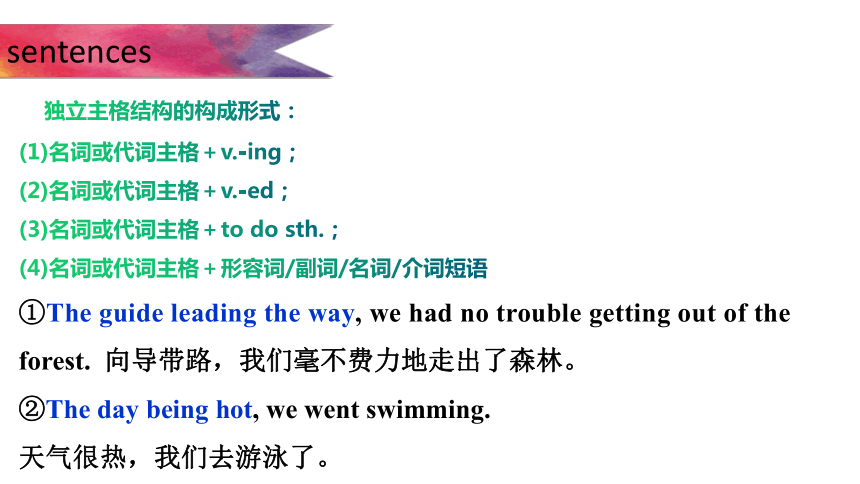
文档简介
(共57张PPT)
u n i t 3
01
02
03
04
Listeng and Speaking
Reading and Thinking
Useful Structures
Reading for Writing
01
PART ONE
Listening and Speaking
1. diversity n. 差异(性);不同(点);多样性
words
[搭配] a great diversity of 多种多样的
[同根词] diverse adj.不同的;多种多样的
be diverse from... 和……不同
diverse views 不同的观点
[例句]
As is known to us, New York City is a diverse area.
众所周知,纽约是一个多元化的地方。
[搭配] make a fortune 发财
try one's fortune 碰运气
have the good fortune to do sth. 有幸做某事
seek one’s fortune 寻找成功致富之路
[例句]
It is believed that setting off fireworks will bring good fortune for people in the coming year.
人们认为燃放烟花会在新的一年给人们带来好运。
2. fortune n.机会;运气;财富
words
[同根词] fortunate adj. 幸运的,吉利的;侥幸的;交好运的
be fortunate to do sth./in doing sth. 有幸做某事
consider sb./oneself fortunate 认为某人/自己幸运
It’s fortunate for sb. to do/that 对某人来说...是幸运的
fortunately adv. 幸运地;侥幸地
unfortunate adj. 不幸的;令人遗憾的;可惜的
unfortunately adv. 不幸地;遗憾地;可惜地;可悲地
misfortune n. 不幸
2. fortune n.机会;运气;财富
words
02
PART TWO
Reading and Thinking
[搭配] be admitted as... 作为……被接受
admit sb. to/into =be admitted into/to... 被……录取;被……接收
admit sb./sth. as/to be... 承认某人/某事是……
admit that... 承认……
admit doing/having done... 承认做了……
admit to sb. that 向某人承认...
[例句]
As far as I know, he was admitted as a member of the club.
据我所知,他被接纳为这个俱乐部的一名成员。
[同根词] admission n. 允许进入;入场费
3. admit vi.& vt.承认 vt.准许进入(或加入);容纳
words
[同根词] definite adj. 明确的;肯定的
[搭配] be definate about... 对...有把握
It is definite that... ...是肯定的
[例句]
The look on her face was a definite sign that something was wrong.
indefinite adj. 不明确的
4. definitely adv. 肯定;确实
words
[搭配] sth. occurs to sb. 某人突然想起某事
it occurs to/strikes/hits sb. that... 某人突然想到……
it occurs to sb. to do sth. 某人想到做某事
[例句] A good idea suddenly occurred to me that I could use the money to help the poor child.
我突然想到了一个好主意,我可以用那笔钱去帮助那个可怜的孩子。
[同根词] occurrence n. 发生;发生的事情
5. occur vi.发生;出现
words
There are so many beautiful old buildings—many sitting on top of big hills, offering great views of the city, the ocean, and the Golden Gate Bridge.
这里有众多美丽的古建筑——不少坐落于大山之巅,城市、大海和金门大桥的美景尽收眼底。
独立主格结构
sentences
独立主格结构的构成形式:
(1)名词或代词主格+v. ing;
(2)名词或代词主格+v. ed;
(3)名词或代词主格+to do sth.;
(4)名词或代词主格+形容词/副词/名词/介词短语
①The guide leading the way, we had no trouble getting out of the forest. 向导带路,我们毫不费力地走出了森林。
②The day being hot, we went swimming.
天气很热,我们去游泳了。
sentences
Many of the people living here are from Mexico or Central America.
这里的许多居民来自墨西哥或中美洲。
动词 ing(短语)作定语
(1)living here为动词 ing(短语)作后置定语,修饰the people,相当于一个定语从句“who live here”。
(2)动词 ing(短语)作定语与被修饰的名词之间是逻辑上的主谓关系。
The child standing over there is my brother.
站在那边的那个孩子是我弟弟。
sentences
[搭配] head for/towards (朝……)前进;(向……)去;前往
[例句]We were heading to Paris when our car broke down.
我们在去巴黎的路上时车子抛锚了。
名词转化为动词:
①head n.头→vi.前往
②nurse n.护士→vt.护理
③face n.脸→vt.面对
④bridge n.桥→vt.沟通
⑤eye n.眼睛→vt.看,注视
6. head to (朝……)前进;(向……)去
words
[搭配] seek fame 追求名声
seek one's fortune 寻找成功致富之路;闯世界
seek advice/help from... 向……征求建议/寻求帮助
seek for 寻找
seek to do sth. 试图做某事
seek out 找出;找到
[例句]
When in trouble, you can seek advice from your teacher.
遇到困难时,你可以向你的老师寻求建议。
7. seek vt.& vi.寻找;寻求;争取;(向人)请求
words
[搭配] earn money=make money 挣钱
earn a living=make a living 谋生
earn the respect of sb. 赢得某人的尊敬
earn a fortune 挣大钱
earn a reputation 赢得声誉
[例句] As a teacher, she has earned the respect of her students.
作为教师,她赢得了学生的尊敬。
[同根词] earnings n. 利润;收入,工资
8. earn vt.& vi.挣得;赚得;赢得;博得
words
[搭配] select...as... 挑选……作为……
select sb. to do sth. 挑选某人做某事
select...from... 从……中挑选……
[例句] We can set out early so that we'll have more time to read and select books.
我们可以早点儿出发,这样我们就有更多的时间来读书和选书。
[同根词] selection n. 选择;挑选;入选者;可供选择的事物
9. select vt.选择;挑选;选拔
words
[搭配] bring back 使回想起;使恢复
bring in 引进;生产
bring up 抚养,抚育;谈及
bring down 降低;减少
bring forward 将......提前;提议
bring out 使显现;使表现出
[例句] Many new changes have been brought about in China's industry.
中国的工业已经发生了许多新的变化。
10. bring about 导致;引起
words
11.1 claim n.夺取(生命);宣称;断言;索赔
[搭配] make a claim 索赔;对(赔偿等)提出要求
[例句] They made a claim after their luggage was stolen.
行李被偷后,他们提出了索赔要求。
11.claim vt.& n.夺取(生命);宣称;断言;索赔
words
11.1 claim vt.夺取(生命);宣称;断言;索赔
[搭配] claim to do sth./that... 声称做某事
claim to have done sth. 声称已做某事
claim sth. back 要回某物
claim sth. from sb. for sth. 因为……向某人索要……赔偿金
it is claimed that... 据称……
[例句] It is claimed that humour can help patients recover faster.
11.claim vt.& n.夺取(生命);宣称;断言;索赔
words
12.1 escape vi.& vt.逃走;逃脱;避开;被遗忘;被忽视
[搭配] escape from... 从……中逃脱
escape to... 逃到......
escape doing sth. 逃避做某事
escape one's attention/notice 逃过某人的注意
[例句] Luckily, he escaped from the burning building.
幸运的是,他从燃烧的大楼里逃了出来。
12.escape vi.& vt.逃走;逃脱;避开;被遗忘;被忽视 n.逃跑;逃脱;解脱
words
12.1 escape n.逃跑;逃脱;解脱
[搭配] a narrow escape 九死一生
make one’s escape 逃脱
an escape from reality 逃避现实
[例句] The little girl had a narrow escape when the earthquake happened.
12.escape vi.& vt.逃走;逃脱;避开;被遗忘;被忽视 n.逃跑;逃脱;解脱
words
03
PART THREE
Useful Structures
为了避免重复,将句子中的一个或几个成分省去,这种语法现象叫省略。省略是避免重复、突出新信息并使上下文紧密连接的一种语法手段。英语中的省略有下列几种情况。
句法
一、简单句中的省略
1.祈使句的省略
在祈使句中,通常省略主语 you。
◆(You) Go down this street and turn right at the second crossing.
请(你)沿着这条街走,然后在第二个十字路口向右拐。
2.There be 句型的省略
◆(Is there) Anything else (还有)其他东西吗?
3.疑问句的答语省略
◆—Are you from America
—Yes, I am (from America).
——你来自美国吗?
——是的,我是(来自美国)。
4.感叹句的省略
在what 和 how 引起的感叹句中常省略主语和 be 动词。
◆What a beautiful city (it is)!
(这是)多么美丽的城市呀!
二、并列句中的省略
在由and或but 连接的并列句中,常省略一些重复的词或词组。
1.省略共同的主语或宾语。
◆Tom picked up a book on the floor and (Tom) handed it to the teacher.
2.若主语不同,而谓语部分的系动词、助动词或情态动词相同,则省略后面的系动词、助动词或情态动词。
◆Jack must have been playing football and Mary (must have been) doing her homework.
杰克肯定一直在踢足球,玛丽肯定一直在做作业。
3.若主语与谓语动词相同,则省略后面的主谓成分。
◆His advice made me happy, but (his advice made) Jim angry.他的建议使我高兴,却使吉姆生气。
4.若主语不同,但主要动词及后续部分相同,则省略主要动词及后续部分。
◆He has a knowledge of first aid but his friend doesn't (have a knowledge of first aid).
他具备急救知识,但他朋友不具备。
三、复合句中的省略
1.宾语从句的省略
在宾语从句中,连词 that 常省略,但当有多个并列宾语从句时,只能省略第一个that。由which、when、where、how和why引导的宾语从句,可以全部或部分省略。
◆I truly believe (that) beauty comes from within.
我真的相信美丽来自内心。
◆He said (that) the text was very important and that we should learn it by heart.
他说这篇课文很重要,我们应该用心学习。
◆I know that a movie star will come to our city, but I don't know when (he/she will come to our city).
我知道一个电影明星将要来我们市,但我不知道他/她什么时候来。
2.状语从句的省略
(1)在when、while、if、as if、though、although、as、until、once、whether、unless、whenever 等引导的状语从句中,当从句主语跟主句的主语相同且从句谓语中含有系动词 be 或从句的主语为 it 时,则从句中主语和 be 动词常被省略。
◆When (it is) necessary, I will turn to you for help.
必要的时候我会向你求助的。
◆Look out for cars when (you are) crossing the street.
过街时要当心车辆。
(2)在than、as等引导的比较状语从句中常省略某些成分。
◆They don't use more water than (it is) necessary.
他们使用的水没有超出需要量。
◆He runs as fast as Bob (runs).
他和鲍勃跑得一样快。
3.定语从句的省略
(1)在限制性定语从句中,作宾语用的关系代词 whom、 which、 that 可省略,但whom、which 紧跟在介词后时不能省略。
◆The exact year (which/that) Angela and her family spent together in China was 2018.
安吉拉和她的家人一起在中国度过的那一年是2018年。
(2)在定语从句中way作先行词,且在句中充当方式状语时,可省略引导定语从句的关系代词。
◆I don't like the way (that) he speaks to me.
我不喜欢他对我说话的方式。
(3)在以the same…as…或such as引导的某些定语从句中,也可省略与主句相同的部分。 I have the same trouble as you (have).
我和你有同样的困难。
词法
(一)动词不定式的省略
1.并列的不定式可以省略后面的不定式符号 to。但若两个不定式之间表示对比关系时,不省略to。
◆The book is intended to be read and not (to) be torn.
这本书是供人阅读的而不是供人撕毁的。
◆The purpose of new technologies is to make life easier, not to make it more difficult.
新技术的目的是要让生活更轻松自在,而不是让生活更困难。
2.某些使役动词如 make、let、have等和感官动词如 see、watch、notice、observe 等后面作宾补的不定式需省略 to, 但若这些动词用于被动语态,则不省略to。
◆My mother wouldn't let me (to) go to see the film.
我妈妈不会让我去看电影的。
◆He was noticed to leave the office.
有人注意到他离开了办公室。
3.不定式符号 to 后面的内容也可承前省略,此时所省略的成分相当于 do so, 但一定要有上下文语境。但倘若不定式含有做助动词用的 have 或 be 的任何形式,to 后要保留原形 have 或 be。
◆I would do it for you, but I don't know how to (do it for you).
我愿意为你做这件事,但是我不知道怎么去做。
◆She has succeeded in the final examination, but in fact, she ought to have (succeeded in the final examination).
她在期末考试中取得了成功,而实际上,她本就该获得成功。
4.介词 but、except (除了) 前有实义动词 do 的具体形式时,后面的不定式不带 to。
◆All he could do was nothing but (to) wait and see.
他所能做的只有等着看看(情况)。
(二)介词的省略
1.一些与动词、名词或形容词搭配的介词常常省略。常见的结构有:
have difficulty/trouble (in) doing sth. 做某事有困难
be busy (in) doing sth. 忙于做某事
spend some time (in) doing sth. 花费时间做某事
stop/prevent sb.(from) doing sth. 阻止某人做某事
There is no sense/point (in) doing sth. 做某事没有意义。
It is no good/use (in) doing sth. 做某事没有用
◆Mr Brown has some difficulty (in) adapting to the new climate.
布朗先生不大容易适应新的气候。
◆The heavy rain prevented him (from) arriving there on time.
大雨使得他没能按时到达那里。
◆He spent four hours (in) going over his lessons.
他花了四个小时复习功课。
2.表示时间的介词at、on 和 in、在next、last、this、that、these、yesterday、tomorrow、one、any、every、each、some等词之前时,一般省略。
◆We may go out next Sunday, but that depends.
下周日我们可能去郊游,但那要看情况而定。
◆If weather permits, we will go to the park tomorrow.
如果天气好的话,明天我们将去公园。
(三)使用so、not等时的省略
英语中,可以使用so、not或其他手段来省略上文或问句中的一部分或整个句子。
◆—Can I put my bike here ——我可以把自行车放在这儿吗?
—You'd better not.——你最好不要。
◆—Do you think our team will win ——你认为我们队会赢吗?
—I think so. ——我认为是这样。
hope、guess、be afraid 的否定形式只能用 not 的形式,不能用not...so 的形式。
(四)冠词的省略
1.两个并列名词前有相同的冠词时,在不引起歧义的情况下,第二个名词前的冠词常常会省略。
Is the baby a boy or (a) girl 这个婴儿是男孩还是女孩?
用and连接两个表示职业或身份的名词时,如果两个名词前只有一个冠词,通常情况下指的是同一个人或事物;如果两个名词前都有冠词,则通常指两个不同的人或事物。
a gardener and gatekeeper
a gardener and a gatekeeper
2.在as/though 引导的状语从句的倒装结构中,当句首是名词时,要省略冠词。
◆Child as he is,he knows a lot about English literature.
他虽然是个孩子,但很了解英国文学。
◆Star though she is,the girl always remains modest.
这个女孩虽然是个明星,但始终保持谦逊。
3.表示独一无二的头衔、职位等的名词做表语或补足语时,常省略冠词。
◆The man who is speaking is dean of the English department.
正在讲话的那个人是英语系主任。
◆She was appointed director of the commercial organisation.
她被任命为这个商业机构的主管。
4.在某些独立主格结构中冠词也要省略。
◆He came in,book in hand = He came in,with a book in his hand.
他走了进来,手里拿着一本书。
5.副词的最高级前通常省略最高级the
◆The hungry young man eats most.
[搭配] fold up/away 折叠起来
fold one's arms 双臂交叉在胸前
a folded letter 一封折叠信
[例句]
He folded up his umbrella as he entered the room.
他进屋时把伞折了起来。
[同根词] unfold vt. 展开
folding adj. 可折叠的
13. fold vt.包;裹;折叠 vt.& vi.(可)折小;(可)叠平
words
04
PART FOUR
Reading for writing
[搭配] settle in/into 安顿下来;适应
settle down (使)安定;安居
settle down to (doing) sth. 着手认真(做)某事
[例句]
They'd like to see their daughter settle down, get married and have kids.
他们想看着女儿安顿下来,结婚生子。
[同根词] settler n. 移居者;殖民者
settlement n. 协议;解决;处理
14. settle vt.& vi.定居;结束(争论);解决(纠纷)
words
[搭配] under construction 在建设中
under repair 在修理中
under discussion 在讨论中
under consideration 在考虑中
under observation 在监视中
under treatment 在治疗中
[例句] As far as I know, the construction of the tower took about 2 years. 据我所知,建造这座塔花了大约2年时间。
[同根词] construct vt. 建造;构成
15. construction n.建筑;建造;建造物;(句子、短语等的)结构
words
[搭配] suit one's needs 适合某人的需要
[同根词] suitable adj. 合适的,适当的;相配的
be suitable for sb./sth. 适合某人/某物
be suitable to do sth. 适合做某事
[例句]
His goal is to make a film that is suitable for children.
16. suit vt.适合;满足……需要;相配;合身 n.西服;套装
words
[搭配] at hand 在手边,在附近
by hand 用手工
hand in hand 手拉手
on the one hand...on the other hand... 一方面……另一方面……
second—hand 二手的
[例句]
I found out my grades on the Internet at first hand.
我在互联网上直接查到了我的成绩。
17. (at) first hand 第一手;亲自
words
[搭配] contain oneself 控制自己
A contains B B在A里面
A includes B B是A的一部分
[例句]
I'm glad to find the book which contains all the information I need. 我很高兴找到了那本包含我所需要的所有信息的书。
[同根词] container n. 容器
18.contain vt.包含;含有;容纳;克制,抑制(感情)
words
u n i t 3
01
02
03
04
Listeng and Speaking
Reading and Thinking
Useful Structures
Reading for Writing
01
PART ONE
Listening and Speaking
1. diversity n. 差异(性);不同(点);多样性
words
[搭配] a great diversity of 多种多样的
[同根词] diverse adj.不同的;多种多样的
be diverse from... 和……不同
diverse views 不同的观点
[例句]
As is known to us, New York City is a diverse area.
众所周知,纽约是一个多元化的地方。
[搭配] make a fortune 发财
try one's fortune 碰运气
have the good fortune to do sth. 有幸做某事
seek one’s fortune 寻找成功致富之路
[例句]
It is believed that setting off fireworks will bring good fortune for people in the coming year.
人们认为燃放烟花会在新的一年给人们带来好运。
2. fortune n.机会;运气;财富
words
[同根词] fortunate adj. 幸运的,吉利的;侥幸的;交好运的
be fortunate to do sth./in doing sth. 有幸做某事
consider sb./oneself fortunate 认为某人/自己幸运
It’s fortunate for sb. to do/that 对某人来说...是幸运的
fortunately adv. 幸运地;侥幸地
unfortunate adj. 不幸的;令人遗憾的;可惜的
unfortunately adv. 不幸地;遗憾地;可惜地;可悲地
misfortune n. 不幸
2. fortune n.机会;运气;财富
words
02
PART TWO
Reading and Thinking
[搭配] be admitted as... 作为……被接受
admit sb. to/into =be admitted into/to... 被……录取;被……接收
admit sb./sth. as/to be... 承认某人/某事是……
admit that... 承认……
admit doing/having done... 承认做了……
admit to sb. that 向某人承认...
[例句]
As far as I know, he was admitted as a member of the club.
据我所知,他被接纳为这个俱乐部的一名成员。
[同根词] admission n. 允许进入;入场费
3. admit vi.& vt.承认 vt.准许进入(或加入);容纳
words
[同根词] definite adj. 明确的;肯定的
[搭配] be definate about... 对...有把握
It is definite that... ...是肯定的
[例句]
The look on her face was a definite sign that something was wrong.
indefinite adj. 不明确的
4. definitely adv. 肯定;确实
words
[搭配] sth. occurs to sb. 某人突然想起某事
it occurs to/strikes/hits sb. that... 某人突然想到……
it occurs to sb. to do sth. 某人想到做某事
[例句] A good idea suddenly occurred to me that I could use the money to help the poor child.
我突然想到了一个好主意,我可以用那笔钱去帮助那个可怜的孩子。
[同根词] occurrence n. 发生;发生的事情
5. occur vi.发生;出现
words
There are so many beautiful old buildings—many sitting on top of big hills, offering great views of the city, the ocean, and the Golden Gate Bridge.
这里有众多美丽的古建筑——不少坐落于大山之巅,城市、大海和金门大桥的美景尽收眼底。
独立主格结构
sentences
独立主格结构的构成形式:
(1)名词或代词主格+v. ing;
(2)名词或代词主格+v. ed;
(3)名词或代词主格+to do sth.;
(4)名词或代词主格+形容词/副词/名词/介词短语
①The guide leading the way, we had no trouble getting out of the forest. 向导带路,我们毫不费力地走出了森林。
②The day being hot, we went swimming.
天气很热,我们去游泳了。
sentences
Many of the people living here are from Mexico or Central America.
这里的许多居民来自墨西哥或中美洲。
动词 ing(短语)作定语
(1)living here为动词 ing(短语)作后置定语,修饰the people,相当于一个定语从句“who live here”。
(2)动词 ing(短语)作定语与被修饰的名词之间是逻辑上的主谓关系。
The child standing over there is my brother.
站在那边的那个孩子是我弟弟。
sentences
[搭配] head for/towards (朝……)前进;(向……)去;前往
[例句]We were heading to Paris when our car broke down.
我们在去巴黎的路上时车子抛锚了。
名词转化为动词:
①head n.头→vi.前往
②nurse n.护士→vt.护理
③face n.脸→vt.面对
④bridge n.桥→vt.沟通
⑤eye n.眼睛→vt.看,注视
6. head to (朝……)前进;(向……)去
words
[搭配] seek fame 追求名声
seek one's fortune 寻找成功致富之路;闯世界
seek advice/help from... 向……征求建议/寻求帮助
seek for 寻找
seek to do sth. 试图做某事
seek out 找出;找到
[例句]
When in trouble, you can seek advice from your teacher.
遇到困难时,你可以向你的老师寻求建议。
7. seek vt.& vi.寻找;寻求;争取;(向人)请求
words
[搭配] earn money=make money 挣钱
earn a living=make a living 谋生
earn the respect of sb. 赢得某人的尊敬
earn a fortune 挣大钱
earn a reputation 赢得声誉
[例句] As a teacher, she has earned the respect of her students.
作为教师,她赢得了学生的尊敬。
[同根词] earnings n. 利润;收入,工资
8. earn vt.& vi.挣得;赚得;赢得;博得
words
[搭配] select...as... 挑选……作为……
select sb. to do sth. 挑选某人做某事
select...from... 从……中挑选……
[例句] We can set out early so that we'll have more time to read and select books.
我们可以早点儿出发,这样我们就有更多的时间来读书和选书。
[同根词] selection n. 选择;挑选;入选者;可供选择的事物
9. select vt.选择;挑选;选拔
words
[搭配] bring back 使回想起;使恢复
bring in 引进;生产
bring up 抚养,抚育;谈及
bring down 降低;减少
bring forward 将......提前;提议
bring out 使显现;使表现出
[例句] Many new changes have been brought about in China's industry.
中国的工业已经发生了许多新的变化。
10. bring about 导致;引起
words
11.1 claim n.夺取(生命);宣称;断言;索赔
[搭配] make a claim 索赔;对(赔偿等)提出要求
[例句] They made a claim after their luggage was stolen.
行李被偷后,他们提出了索赔要求。
11.claim vt.& n.夺取(生命);宣称;断言;索赔
words
11.1 claim vt.夺取(生命);宣称;断言;索赔
[搭配] claim to do sth./that... 声称做某事
claim to have done sth. 声称已做某事
claim sth. back 要回某物
claim sth. from sb. for sth. 因为……向某人索要……赔偿金
it is claimed that... 据称……
[例句] It is claimed that humour can help patients recover faster.
11.claim vt.& n.夺取(生命);宣称;断言;索赔
words
12.1 escape vi.& vt.逃走;逃脱;避开;被遗忘;被忽视
[搭配] escape from... 从……中逃脱
escape to... 逃到......
escape doing sth. 逃避做某事
escape one's attention/notice 逃过某人的注意
[例句] Luckily, he escaped from the burning building.
幸运的是,他从燃烧的大楼里逃了出来。
12.escape vi.& vt.逃走;逃脱;避开;被遗忘;被忽视 n.逃跑;逃脱;解脱
words
12.1 escape n.逃跑;逃脱;解脱
[搭配] a narrow escape 九死一生
make one’s escape 逃脱
an escape from reality 逃避现实
[例句] The little girl had a narrow escape when the earthquake happened.
12.escape vi.& vt.逃走;逃脱;避开;被遗忘;被忽视 n.逃跑;逃脱;解脱
words
03
PART THREE
Useful Structures
为了避免重复,将句子中的一个或几个成分省去,这种语法现象叫省略。省略是避免重复、突出新信息并使上下文紧密连接的一种语法手段。英语中的省略有下列几种情况。
句法
一、简单句中的省略
1.祈使句的省略
在祈使句中,通常省略主语 you。
◆(You) Go down this street and turn right at the second crossing.
请(你)沿着这条街走,然后在第二个十字路口向右拐。
2.There be 句型的省略
◆(Is there) Anything else (还有)其他东西吗?
3.疑问句的答语省略
◆—Are you from America
—Yes, I am (from America).
——你来自美国吗?
——是的,我是(来自美国)。
4.感叹句的省略
在what 和 how 引起的感叹句中常省略主语和 be 动词。
◆What a beautiful city (it is)!
(这是)多么美丽的城市呀!
二、并列句中的省略
在由and或but 连接的并列句中,常省略一些重复的词或词组。
1.省略共同的主语或宾语。
◆Tom picked up a book on the floor and (Tom) handed it to the teacher.
2.若主语不同,而谓语部分的系动词、助动词或情态动词相同,则省略后面的系动词、助动词或情态动词。
◆Jack must have been playing football and Mary (must have been) doing her homework.
杰克肯定一直在踢足球,玛丽肯定一直在做作业。
3.若主语与谓语动词相同,则省略后面的主谓成分。
◆His advice made me happy, but (his advice made) Jim angry.他的建议使我高兴,却使吉姆生气。
4.若主语不同,但主要动词及后续部分相同,则省略主要动词及后续部分。
◆He has a knowledge of first aid but his friend doesn't (have a knowledge of first aid).
他具备急救知识,但他朋友不具备。
三、复合句中的省略
1.宾语从句的省略
在宾语从句中,连词 that 常省略,但当有多个并列宾语从句时,只能省略第一个that。由which、when、where、how和why引导的宾语从句,可以全部或部分省略。
◆I truly believe (that) beauty comes from within.
我真的相信美丽来自内心。
◆He said (that) the text was very important and that we should learn it by heart.
他说这篇课文很重要,我们应该用心学习。
◆I know that a movie star will come to our city, but I don't know when (he/she will come to our city).
我知道一个电影明星将要来我们市,但我不知道他/她什么时候来。
2.状语从句的省略
(1)在when、while、if、as if、though、although、as、until、once、whether、unless、whenever 等引导的状语从句中,当从句主语跟主句的主语相同且从句谓语中含有系动词 be 或从句的主语为 it 时,则从句中主语和 be 动词常被省略。
◆When (it is) necessary, I will turn to you for help.
必要的时候我会向你求助的。
◆Look out for cars when (you are) crossing the street.
过街时要当心车辆。
(2)在than、as等引导的比较状语从句中常省略某些成分。
◆They don't use more water than (it is) necessary.
他们使用的水没有超出需要量。
◆He runs as fast as Bob (runs).
他和鲍勃跑得一样快。
3.定语从句的省略
(1)在限制性定语从句中,作宾语用的关系代词 whom、 which、 that 可省略,但whom、which 紧跟在介词后时不能省略。
◆The exact year (which/that) Angela and her family spent together in China was 2018.
安吉拉和她的家人一起在中国度过的那一年是2018年。
(2)在定语从句中way作先行词,且在句中充当方式状语时,可省略引导定语从句的关系代词。
◆I don't like the way (that) he speaks to me.
我不喜欢他对我说话的方式。
(3)在以the same…as…或such as引导的某些定语从句中,也可省略与主句相同的部分。 I have the same trouble as you (have).
我和你有同样的困难。
词法
(一)动词不定式的省略
1.并列的不定式可以省略后面的不定式符号 to。但若两个不定式之间表示对比关系时,不省略to。
◆The book is intended to be read and not (to) be torn.
这本书是供人阅读的而不是供人撕毁的。
◆The purpose of new technologies is to make life easier, not to make it more difficult.
新技术的目的是要让生活更轻松自在,而不是让生活更困难。
2.某些使役动词如 make、let、have等和感官动词如 see、watch、notice、observe 等后面作宾补的不定式需省略 to, 但若这些动词用于被动语态,则不省略to。
◆My mother wouldn't let me (to) go to see the film.
我妈妈不会让我去看电影的。
◆He was noticed to leave the office.
有人注意到他离开了办公室。
3.不定式符号 to 后面的内容也可承前省略,此时所省略的成分相当于 do so, 但一定要有上下文语境。但倘若不定式含有做助动词用的 have 或 be 的任何形式,to 后要保留原形 have 或 be。
◆I would do it for you, but I don't know how to (do it for you).
我愿意为你做这件事,但是我不知道怎么去做。
◆She has succeeded in the final examination, but in fact, she ought to have (succeeded in the final examination).
她在期末考试中取得了成功,而实际上,她本就该获得成功。
4.介词 but、except (除了) 前有实义动词 do 的具体形式时,后面的不定式不带 to。
◆All he could do was nothing but (to) wait and see.
他所能做的只有等着看看(情况)。
(二)介词的省略
1.一些与动词、名词或形容词搭配的介词常常省略。常见的结构有:
have difficulty/trouble (in) doing sth. 做某事有困难
be busy (in) doing sth. 忙于做某事
spend some time (in) doing sth. 花费时间做某事
stop/prevent sb.(from) doing sth. 阻止某人做某事
There is no sense/point (in) doing sth. 做某事没有意义。
It is no good/use (in) doing sth. 做某事没有用
◆Mr Brown has some difficulty (in) adapting to the new climate.
布朗先生不大容易适应新的气候。
◆The heavy rain prevented him (from) arriving there on time.
大雨使得他没能按时到达那里。
◆He spent four hours (in) going over his lessons.
他花了四个小时复习功课。
2.表示时间的介词at、on 和 in、在next、last、this、that、these、yesterday、tomorrow、one、any、every、each、some等词之前时,一般省略。
◆We may go out next Sunday, but that depends.
下周日我们可能去郊游,但那要看情况而定。
◆If weather permits, we will go to the park tomorrow.
如果天气好的话,明天我们将去公园。
(三)使用so、not等时的省略
英语中,可以使用so、not或其他手段来省略上文或问句中的一部分或整个句子。
◆—Can I put my bike here ——我可以把自行车放在这儿吗?
—You'd better not.——你最好不要。
◆—Do you think our team will win ——你认为我们队会赢吗?
—I think so. ——我认为是这样。
hope、guess、be afraid 的否定形式只能用 not 的形式,不能用not...so 的形式。
(四)冠词的省略
1.两个并列名词前有相同的冠词时,在不引起歧义的情况下,第二个名词前的冠词常常会省略。
Is the baby a boy or (a) girl 这个婴儿是男孩还是女孩?
用and连接两个表示职业或身份的名词时,如果两个名词前只有一个冠词,通常情况下指的是同一个人或事物;如果两个名词前都有冠词,则通常指两个不同的人或事物。
a gardener and gatekeeper
a gardener and a gatekeeper
2.在as/though 引导的状语从句的倒装结构中,当句首是名词时,要省略冠词。
◆Child as he is,he knows a lot about English literature.
他虽然是个孩子,但很了解英国文学。
◆Star though she is,the girl always remains modest.
这个女孩虽然是个明星,但始终保持谦逊。
3.表示独一无二的头衔、职位等的名词做表语或补足语时,常省略冠词。
◆The man who is speaking is dean of the English department.
正在讲话的那个人是英语系主任。
◆She was appointed director of the commercial organisation.
她被任命为这个商业机构的主管。
4.在某些独立主格结构中冠词也要省略。
◆He came in,book in hand = He came in,with a book in his hand.
他走了进来,手里拿着一本书。
5.副词的最高级前通常省略最高级the
◆The hungry young man eats most.
[搭配] fold up/away 折叠起来
fold one's arms 双臂交叉在胸前
a folded letter 一封折叠信
[例句]
He folded up his umbrella as he entered the room.
他进屋时把伞折了起来。
[同根词] unfold vt. 展开
folding adj. 可折叠的
13. fold vt.包;裹;折叠 vt.& vi.(可)折小;(可)叠平
words
04
PART FOUR
Reading for writing
[搭配] settle in/into 安顿下来;适应
settle down (使)安定;安居
settle down to (doing) sth. 着手认真(做)某事
[例句]
They'd like to see their daughter settle down, get married and have kids.
他们想看着女儿安顿下来,结婚生子。
[同根词] settler n. 移居者;殖民者
settlement n. 协议;解决;处理
14. settle vt.& vi.定居;结束(争论);解决(纠纷)
words
[搭配] under construction 在建设中
under repair 在修理中
under discussion 在讨论中
under consideration 在考虑中
under observation 在监视中
under treatment 在治疗中
[例句] As far as I know, the construction of the tower took about 2 years. 据我所知,建造这座塔花了大约2年时间。
[同根词] construct vt. 建造;构成
15. construction n.建筑;建造;建造物;(句子、短语等的)结构
words
[搭配] suit one's needs 适合某人的需要
[同根词] suitable adj. 合适的,适当的;相配的
be suitable for sb./sth. 适合某人/某物
be suitable to do sth. 适合做某事
[例句]
His goal is to make a film that is suitable for children.
16. suit vt.适合;满足……需要;相配;合身 n.西服;套装
words
[搭配] at hand 在手边,在附近
by hand 用手工
hand in hand 手拉手
on the one hand...on the other hand... 一方面……另一方面……
second—hand 二手的
[例句]
I found out my grades on the Internet at first hand.
我在互联网上直接查到了我的成绩。
17. (at) first hand 第一手;亲自
words
[搭配] contain oneself 控制自己
A contains B B在A里面
A includes B B是A的一部分
[例句]
I'm glad to find the book which contains all the information I need. 我很高兴找到了那本包含我所需要的所有信息的书。
[同根词] container n. 容器
18.contain vt.包含;含有;容纳;克制,抑制(感情)
words
